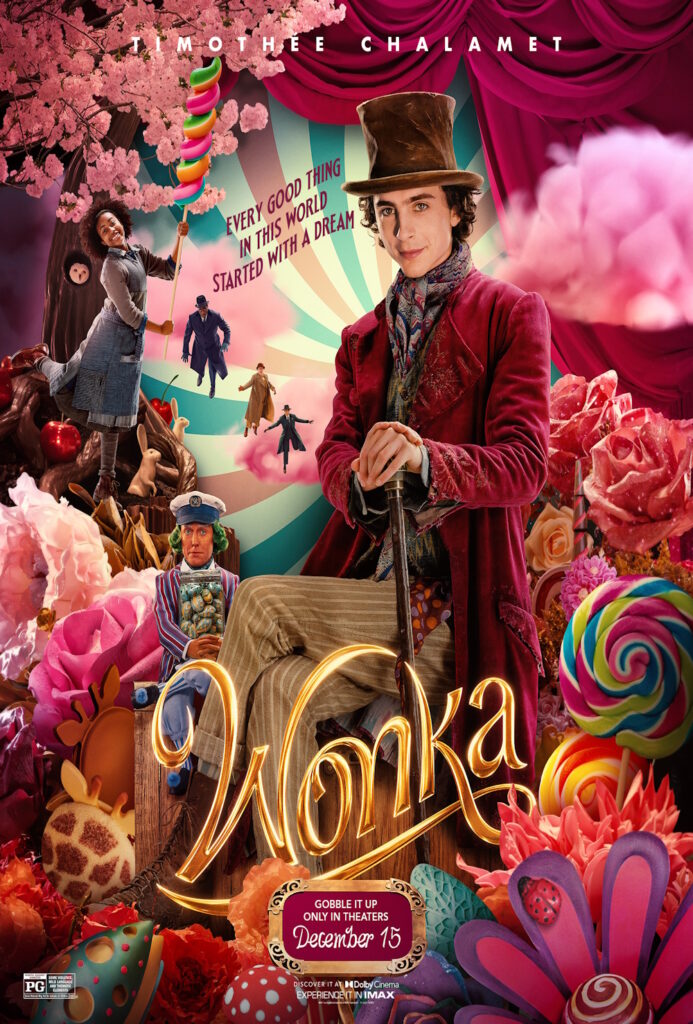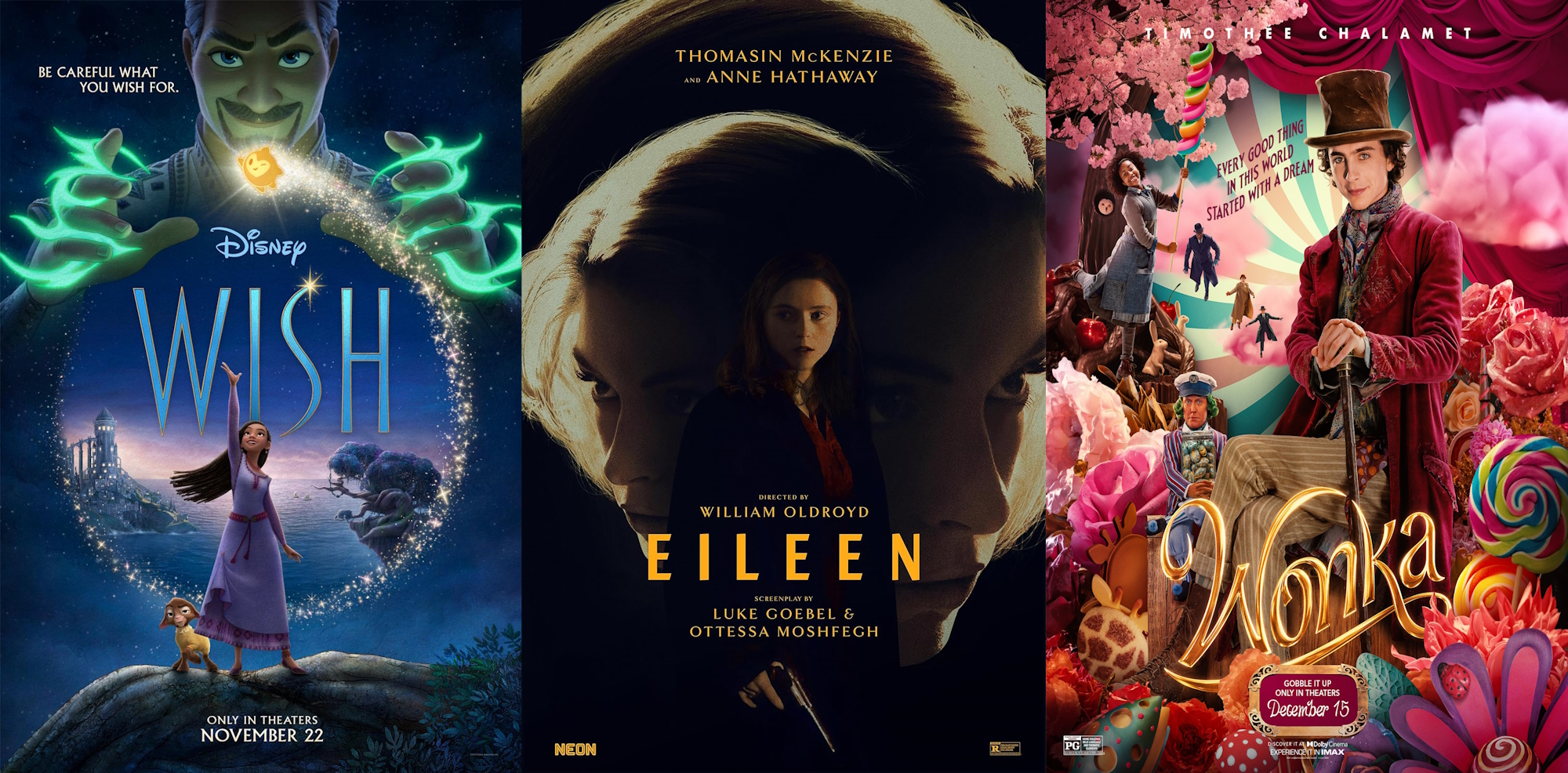
Wish
The general gist of this film goes like this: A teenage girl, Asha, wants to become the King’s apprentice, all in the hopes that she might get into the good books of the King. A King, by the way, who happens to also be a sorcerer who keeps hold of all the wishes from the inhabitants of the kingdom, granting one wish every month, at a ceremony. Did I mention that Asha’s Grandad is also turning 100? And what better way to celebrate it than getting the King to grant his lifelong wish? Can you see why she wants to be in his good books now? When she finds out that King Magnifico has no intention of granting everyone’s wish – including her Grandad’s – things start to go astray, as Asha attempts to rescue her Grandfather’s wish from captivity, alongside many other’s wishes.
It’s a straight-cut and dry story from Disney. In fact, it’s so cookie-cutter that I bet if you put the line “Create an animated Disney film script” into ChatGPT, this would be the outcome. The same can go for the animation of the film. It’s super bland to look at and lacks the inspiration from many of the Disney cartoons it’s referencing. The entire mise-en-scène looks like it could’ve been completely computer-generated. When the sky’s the limit with animation, why does this look bereft of inspiration and creativity? What I will add though, is that the songs aren’t half bad. At best, some are good in the moment; at worst, you tune out halfway through. One thing is for sure: I won’t remember them going forward.
If this movie was a way to celebrate Disney’s 100th Anniversary, I couldn’t be more underwhelmed. From a company that used to spark so much wonder in the hearts of children, to a brand that decided to create an AI-generated title sequence for Secret Invasion instead of hiring real artists. If they’re so desperate to make people’s wishes come through, they should’ve looked closer into their history and realised what the key to their success was, instead of merely referencing it. The title of this movie is very apropos. This isn’t a Disney movie; this is the Wish.com version of a Disney movie.

Eileen
From the opening credits of Eileen, we’re placed back into the past, with the title cards looking like they’re from the ‘60s, and some actually coming from the ‘60s, like the Universal one. If there’s one thing Eileen gets right, it’s setting the tone, and it’s already been set before we even see the first frame of the film. The young, sweet, innocent (yet, extremely horny) Eileen has a simple routine: Go to work at the prison for teenage boys, make a stop at a store to get booze for her father, go home, eat chocolate, fall asleep. Fairly simple regiment. Restricted to this until a woman named Rebecca enters her life, working as a psychologist to the boys. The two grow closer together with Eileen – wanting to impress Rebecca more and more – slowly becomes more like her; putting down the sweets for a pack of cigarettes instead.
Ottessa Moshfegh and Luke Goebel write the screenplay for this film, with the former being the author of the book on which this is based. Working off their script, director William Oldroyd helms this film with prowess. Although it has the appearance of being shot on film, it’s a digital image coated with film grain. The illusion that cinematographer, Ari Wegner, brings works a treat, as the roughness of the picture significantly adds to bringing us one step closer into this world filled with grime and harsh truths. Who knew that such a polluted-looking picture could look so gorgeous?
Just in case that wasn’t enough, extra help comes in the form of a lot of muted colours, bringing a level of drabness to the story; all until Rebecca rolls up in her flashy car, with her blonde hair and red coat, sparkling into the movie like the true femme fatale she is. Soundtracking this arrival is a brooding score from Arcade Fire’s Richard Reed Parry, who deserves plaudits for such a fine arrangement of music.
From the get-go, you get a sense of what Eileen’s life is like. The opening rarely has people speaking, opting to go for a show-don’t-tell approach, and it works a treat. You know Eileen without a single word. This is also significantly helped by a terrific performance by Thomasin McKenzie, who showcases lust, anger, sadness, and disappointment, all through her expressions.
Her timidness dissipates as she copies Rebecca, like when she tries coffee for the first time to be more like her, but adds sugar so she can still have the sweetness she’s used to. As she makes a fantastic transition from a passive person into an active character, the progression of this is such a joy to watch unfold, all thanks to Thomasin McKenzie. She’s not the only one in this with a stellar performance.
Shea Whigham as her father plays a person that you really wish you could punch in the face and shove down a set of stairs at the same time. He plays it so well in fact, that you wonder how Eileen can resist doing something against him. The other exquisite performance comes from Anne Hathaway. She’s against the grain and so mesmerising to even watch hold a cigarette. She steals the attention of the audience and Eileen, while also being a slight bit intimidating. Watching Thomasin and Anne play off each other is dazzling and the dynamic between them is electrifying.
Hathaway has described the film as “Carol meets Reservoir Dogs.” To an extent, that’s a fair description. It’s very much like Carol, but the Reservoir Dogs comparison is a really niche detail. The film plays off as a romantic drama before morphing into a psychological thriller. Yet, unlike the recent Saltburn, it fluidly and elegantly shifts into this. A rug pulled from under our nose rather than snatched, all thanks to it making complete narrative sense. Between the performances, the technical aspects and an engaging story between a young woman and a mature one, Eileen is one film that you wouldn’t want to miss.

Wonka
They’ve dropped “and the Chocolate Factory” from the title for one simple name: Wonka. The problem with calling your film Wonka is that it better be as much fun as it is pronouncing it. The trick that’s up the film’s sleeve is that it’s a musical. I call it a trick as you wouldn’t expect that it was one due to the recent trend of trailers that seem to hide the fact that their film is, indeed, a musical. Examples of that are Wonka and Mean Girls, which I also got a trailer for before the film. What the trailer doesn’t hide however, is that it follows a young Willy Wonka before he ever stepped foot into a chocolate factory. Is there such a need for a story about a young Wonka? Come with me and let’s see if it’s a world of pure imagination.
After trotting around the world for many years, Wonka arrives back to civilization to sell his chocolate, which he’s perfected during the course of his adventures. Wanting to make his product available to the public for an accessible price, his hopes and dreams are constantly shut down by Big Chocolate. One night, when Wonka is broke, he stays in a very welcoming, kind-hearted accommodation. All he needs to do is sign the papers for staying the night. If there’s one lesson to be learned from Wonka, it’s to always look at the terms and conditions. Wonka is then conned into paying an insurmountable debt, by the means of working for 10,000 days to pay it off. Luckily, he wasn’t the only one as he meets a group of people who also fell for the hotelier’s trick.
Instantly, the first thought that comes to anyone’s mind about Willy Wonka is the extravagant performance from Gene Wilder, or maybe the unsettling one from Johnny Depp. Timothée Chalamet portrays a young Willy Wonka, one before the success of the chocolate factory and the kerfuffle of those elusive golden tickets. With both of those previous iterations, you couldn’t describe their screen presence as lacking. The same can be said for here. Chalamet brings an energy to the film, with his reactions and deliveries. All this being said, there’s an ‘Umph!’ missing from it; the secret ingredient.
When musical numbers happen, he’s lively but lacking in the eccentricity that Wilder brought to the singing and dancing. For a tagline such as “How Willy became Wonka,” there’s a severe lack in character development for him to turn into the maniacal, chief of chocolate. He’s already the upbeat, cheery, and insane inventor we already know, from the first five minutes to the last. I couldn’t help but want more from the script penned by Paul King and Simon Farnaby, showing more of a transition for Willy, rather than how he got to become the world-famous chocolate manufacturer.
However, the supporting cast the writers provide are such a delight. From the three members of the Chocolate Cartel to Mrs Scrubbit, there’s so much sweetness to this film that causes you to either chuckle or smile. Which is ironic, since if you watch the film, those four characters are fairly heinous; but due to their wicked performances from Olivia Colman, Paterson Joseph, Matt Lucas, and Mathew Baynton, seeing them on screen is a treat worth savouring.
Paul King captures the feel of a Roald Dahl world and the feeling of an old-school musical and puts together a film about dreams and sharing them with the people around you. The zeitgeist doesn’t catch on immediately. With a rather slow first half, before rupturing into a full-on song and dance across the city in the second, and showing off that $125 million budget with some luxurious production design and bringing the wackiness to eleven with its heel-clicking editing transitions. While it can seem grandiose, underneath, there’s a gem of a performance from the young Calah Lane as Noodle, who plays the straight man to Wonka’s off-the-rail ideas. She brings a heartfelt look in her eyes but doesn’t get the payoff she deserves from her story.
Earworming tracks such as “Scrub Scrub” and “Sweet Tooth” bring that childlike grin to your face, worthy songs for a franchise that has arguably one of the most recognisable soundtracks of all time. Even if Chalamet isn’t a Broadway singer, the tracks’ catchiness still drowns out the fact that he could’ve spent a little more time in school doing musical plays. While not relying too heavily on fan service devices to tell its story (you could see an Oompa Loompa cameo from a mile away), Wonka manages to package up a perfectly serviceable chocolate bar while lacking the scrumdiddlyumptious taste from the original it would kill to have.

Dale Kearney is the Film Editor for Post-Burnout, and is a passionate film enthusiast, boasting multiple years studying and working within film, with an intrigue in all genres of film, from horror to comedies to musicals.

 POST-BURNOUT
POST-BURNOUT
One response to “Cinema Corner: “Wish”/”Eileen”/”Wonka””
[…] Cinema Corner: “Wish”/”Eileen”/”Wonka” […]